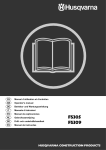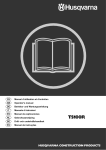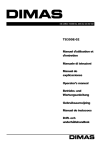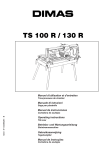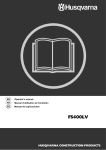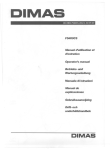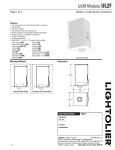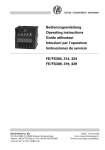Download Husqvarna Webcam FS309 User's Manual
Transcript
EN Operator’s manual FR Manuel d’utilisation et d’entretien ES Manual de explicaciones FS305 FS309 HUSQVARNA CONSTRUCTION PRODUCTS DECLARATION DE CONFORMITE DIRECTIVES EUROPEENNES AUX HUSQVARNA CONSTRUCTION PRODUCTS, 433 81 Gothenburg, Sweden, déclare que la machine FS305, FS309 est conforme aux dispositions des DIRECTIVES : • • • • • "MACHINES" modifiées (89/392/CEE) "BASSE TENSION" modifiées (73/23/CEE) "CEM” (89/336/CEE) ”BRUITS” (2000/14/CEE) ” DECHETS D’EQUIPEMENTS ELECTRIQUES ELECTRONIQUES (DEEE) ” (2002/96/CE) EG-RICHTLIENIEN ERKLÄRUNG WITH HUSQVARNA CONSTRUCTION PRODUCTS, 433 81 Gothenburg, Sweden, herewith declares that the machine FS305, FS309 conforms to the DIRECTIVES : • • • • • "MACHINES" modified (89/392/CEE) "LOW VOLTAGE" modified (73/23/CEE) "EMC” (89/336/CEE) ”NOISE” (2000/14/CEE) ” WASTE ELECTRICAL AND ELECTRNIC EQUIPEMENT (WEEE) ” (2002/96/EC) KONFORMITÄTS- DECLARACIÓN DE CONFORMIDAD CON LAS DIRECTIVAS EUROPEAS HUSQVARNA CONSTRUCTION PRODUCTS, 433 81 Gothenburg, Sweden, erklärt hiermit, daß die machine FS305, FS309 konform ist, mit der : HUSQVARNA CONSTRUCTION PRODUCTS, 433 81 Gothenburg, Sweden, dclara que la máquina FS305, FS309 es conforme a las disposiciones de las DIRECTIVAS : • • • • • – ET DECLARATION OF CONFORMITY EUROPEAN DIRECTIVES "MACHINENBAURICHTLINIE" in Änderungs-fassung (89/392/CEE) "NIEDERSPANNUNGSRICHTLINIE" in Änderungsfassung (73/23/CEE) Linie "ELEKTROMAGNETISCHESTÖR-SICHERHEIT” (89/336/CEE) ”LÄRMSCHUTZRICHTLINIE” (2000/14/CEE) ” ELEKTRO-UND ELEKTRONIK-ALTQERATE“(2002/96/EG) DICHIARAZIONE DI DIRETTIVE EUROPEE "MÁQUINAS" modifiées (89/392/CEE) "BAJA TENSION" modifiées (73/23/CEE) "CEM” (89/336/CEE) ”RUIDOS” (2000/14/CEE) ”RESIDUOS DE APARATOS ELECTRICOS ELECTRONICOS” (2002/96/CE) Y ALLE VERKLARING VAN CONFORMITEIT MET DE EUROPESE RICHTLIJNEN: HUSQVARNA CONSTRUCTION PRODUCTS, 433 81 Gothenburg, Sweden, dichiara che la macchina FS305, FS309 est conforme e conforme alle disposizioni della DIRETTIVA : HUSQVARNA CONSTRUCTION PRODUCTS, 433 81 Gothenburg, Sweden, verklaart dat de machine FS305, FS309 voldoet aan de eisen van de volgende RICHTLIJNEN: • • • • • CONFORMITA' • • • • • "MACCHINE" modificata (89/392/CEE) "BASSA TENSIONE" modificata (73/23/CEE) "CEM” (89/336/CEE) ”RUMORI” (2000/14/CEE) ”DI APPARECCHIATURE ELETTRICHE ELETTRONICHE (RAEE) ” (2002/96/CE) ED • • • • • "MACHINES", gewijzigd (89/392/EEC) "LAAGSPANNING", gewijzigd (73/23/EEC) "CEM” (89/336/EEC) ”GELUID” (2000/14/EEC) ” AFGEDANKTE ELEKTRISCHE EN ELEKTRONISCHE APPARATUUR (AEEA) ” (2002/96/EG) FÖRSÄKRAN OM ÖVERENSSTÄMMELSE ENLIGT EU-DIREKTIVEN: DECLARAÇÃO DE CONFORMIDADE COM AS DIRECTIVAS EUROPEIAS: HUSQVARNA CONSTRUCTION PRODUCTS, 433 81 Gothenburg, Sweden, intygar härmed att maskinen FS305, FS309 uppfyller villkoren i följande DIREKTIV: HUSQVARNA CONSTRUCTION PRODUCTS, 433 81 Gothenburg, Sweden, declara que a máquina FS305, FS309 está em conformidade com as disposições das DIRECTIVAS: • • • • • "MASKINER" och senare ändringar (89/392/CEE) "LÅGSPÄNNINGAR" och senare ändringar (73/23/CEE) "ELEKTROMAGNETISK KOMPATIBILITET" (89/336/CEE) "BULLER" (2000/14/CEE) ”ELEKTRISKA ELLER ELEKTRONISKA PRODUKTER (WEEE) ” (2002/96/EG) • • • • • "MÁQUINAS" modificadas (89/392/CEE) "BAIXA TENSÃO" modificadas (73/23/CEE) "CEM” (89/336/CEE) ”RUÍDOS” (2000/14/CEE) ” RESIDUOS DE EQUIPAMENTOS ELECTRICOS ELECTRONICOS (REEE) ” (2002/96/CE) Christer Carlberg, Operations Manager Husqvarna Construction Products E FIG. 1 ABB. 1 FIG. 2 ABB. 2 FIG. 4 ABB. 4 FIG. 3 ABB. 3 FIG. 5 ABB. 5 EXPLANATION OF SYMBOLS – WARNINGS Explanation of the symbols Safety goggles or eyeshade must be worn. Use of pictograms on the machines (in color) and in the manual indicate safety warnings WATCH OUT! DANGER! General danger signal. REQUIREMENT. The following must always be used with the machine: • certified safety helmet • certified ear protection • certified safety goggles or certified eyeshade. Loud noise in environment as defined by European Community directive. Disk rotation must stop when moving the machine at the work site. Disk must be removed during slinging, loading, unloading and transport at the worksite. Read manual. Carefully READ and assimilate the user’s manual before operating the machine. WARNING. Triangle and black marking on yellow background. Danger if instructions are ignored. Risk of injury to user or third party. Risk of damage to machine or tool. PROHIBITED. Red circle with or without diagonal bar. Use or presence forbidden. INFORMATION or specific instructions on how to use or check the machine. This machine complies with the EC directive in force. STOP symbol. 6 - English This symbol indicates that the machine is in conformance with the applicable European directive. MANDATORY INDICATION INFORMATION INSTRUCTION WARNING PROHIBITION FAILURE TO COMPLY WITH THESE WARNINGS COULD RESULT IN DEATH OR SERIOUS BODILY INJURY. DO carefully read and understand all the instructions before operating the saw. MANUFACTURER N° SERIE SERIAL FABRICATION YEAR ANNEE DE FABRICATION WEIGHT MASSE UTILE Kg MAXI TOOL Ø MAXI OUTIL. mm PLAGE DE TENSION BORE Ø ALESAGE mm FREQUENCE SPEED T/MN - RPM PUISSANCE INT. UTIL. kW V Hz A • Utilisation : sawing with sprinkling of fresh, old or coated (asphalt) concrete. DO Instruction plate TYPE Use • T o o l s : Water-cooled diamondimpregnated discs - Øx350 mm - bore 25.4 mm. (Details from your usual supplier). These signs give advice concerning your safety TYPE 1 FREQUENCY INTENSITY Technical specifications • Depth of cut : Ø 350: 120 mm DO always keep all guards in place. • Nominal weight (unladen) : 48 to 52 kg (depending on version) DO aways wear safety approved hearing, eye, head and respiratory protection. • Service weight : 52 to 70 kg (including tank) POWER VOLTAGE 2 DO keep all parts of your body away from the blade and all other moving parts. DO know how to stop the saw quickly in case of an emergency. • Dimensions (LxWxH) : - 860 x 505 x 990 mm • Speed of spindle rotation : - 2450-2680 rpm (depending on version) POWER LEVEL PRESSURE LEVEL VIBRATION LEVEL Lwa (dB) EN ISO 3744 Lpa (dB) EN ISO 4871 G ENV 25349 HONDA GX160 108 84 1.3 ROBIN EY20 102 88 1.3 MODEL DO shut off the engine and allow it to cool before refueling. DO inspect the blade, flanges and shafts for damage before installing the blade. SPECIAL INSTRUCTIONS DO use caution and follow the instructions when loading and unloading the saw. • Perfect technical condition (use for the purpose for which it is intended and taking into account any risks, and correction of any malfunction detrimental to safety). • Use a diamond disk for cutting with water (sawing new or old concrete, tarmac or asphalt). No other type of disk is allowed (abrasive, saw, etc...). • Competent staff (qualifications, age, training) who have read and understood the manual in detail before starting work: any electrical, mechanical or other problem should be investigated by a qualified maintenance engineer (electrician, maintenance manager, approved dealer, etc . . .). 3 11. 12. 13. 14. 15. 16. 17. 18. 19. 10. 11. 12. Description of the machine [FIG. 1] Handle Motor stop Lowering handwheel Graduated scale Engine Engine oil drain Front guide Belt cover Disk casing Service spanner Water intake tap Tank (17 litres) English The disc cutter is designed to provide safe and reliable service in operating conditions corresponding with the instructions, but it can present dangers for the user and risks of damage, consequently regular on site inspection is necessary to ensure : DO use only blades marked with a maximum operating speed greater than the blade shaft speed. DO NOT DO NOT allow other persons to be near the saw when starting, refueling or when cutting. 4 Handling - Transport DO NOT operate gasoline engines in an enclosed area unless it is properly vented. Switch off the disk prior to moving the machine on jobsite. DO NOT use damaged equipment or blades. Remove the disk prior to hoisting, loading, unloading and transporting the machine on jobsite. DO NOT operate the saw in areas of combustible material. Sparks from the saw could cause a fire or an explosion. Height of adjustable (unscrew the lever (M)) [ SEE FIG. 2]. DO NOT allow blade exposure from the guard to be over 180 degrees. • The ground-saw only needs pushing to move it into position on the site. It is easy to move on its four wheels, without starting the motor. • Respect of the maintenance intervals and periodical checks recommended. DO NOT leave the saw unattended with the motor running. • The handwheel (K) locks the machine itself in the high position. • That only genuine spare parts are used for repairs. DO NOT operate the saw while under the influence of drugs or alcohol. • That the warnings and instructions marked on the machine are followed (adequate personal protection, correct use, general safety instructions, etc). • That no modification, transformation or addition is detrimental to safety and that it is carried out without prior authorization from the manufacturer. handlebars • Light weight, compact, transportable in a vehicle by one person. 7 5 Check before starting • Firmly tighten the screw (D) with the spanner provided with the machine, holding the disc steady by hand. Please read the instructions for use prior to operating the machine for the first time. • Replace the protective guard (if this is not replaced the casing safety switch will prevent the saw being started). Motor off. • Reconnect the water hose (mains with valve or tank). The working area must be completely cleared, well lit and all safety hazards removed (no water or dangerous objects in the vicinity) • Tighten the nut (E). The holding screw (D) of the disc has a right-hand thread. 8 Stopping the machine Motor off • Turn the handwheel (K) to free the disk from the groove [ SEE FIG. 4] . • No need to lock the saw up by releasing the handwheel (K). • Turn off the water supply (G). • Allow the motor to run idle. • Switch off the motor (refere to the motor maintenance manual). The operator must wear protective clothing appropriate to the work he is doing. We recommend that this includes both eye and ear protection Emergency stop Operate the switch (J) in front of the engine. The use of ear protection is mandatory. Any persons not involved in the work should leave the working area Use only blades marked with a maximum operating speed greater than blade shaft speed 9 7 Always pay extreme care and attention to the preparation of the machine before starting up Take into account the working conditions from health and safety point of wiew. • Model with petrol motor (refer to the motor maintenance manual). ■ Make sure the fuel is topped up. ■ Check the oil level; as the motor often English works at an angle, check it frequently in the horizontal position that the oil level is never below the second line on the gauge. ■ To start up, refer to the motor instructions. Remove all adjustment tools and wrenches from floor and machine Always keep blade guard in place Fitting the blade • Place the machine in an high position. • Make sure the engine is switched off. . • Unscrew the nuts (E) from the guard housing [ SEE FIG. 3]. • Remove the guard housing (A). • Fit the diamond impregnated disc. 8 Note the direction of rotation indicated by an arrow on one side of the disc (direction of rotation shown on the outside of the guard housing). Check the state of cleanliness of the disc support faces of the adaptor plates (B and C) and of the spindle. • In all case, disengage the disc from the groove and give the machine a complete check-over. Entrust repairs to authorised dealer only • Mark out a line on the ground where a cut has to be made. • Position the machine so that the lowered front guide (F) and the disc are aligned with the line marked out (disc visble on the belt side of the housing). • Allow the motor to warm up. • Turn on the water supply tap (G) (from the mains or the water tank). Motor off • There may be several causes responsible for arresting the disc in the sawing groove or stopping the machine: ■ Belt tension. ■ Lack of fuel. ■ Advance or lowering too fast, etc. • Turn off the water tap (G) (from the mains or from the tank in order to fill it) [ SEE FIG.x4]. • Start up the motor : refer to the motor manufacturer’s instructions in the service manual. 6 Incidents during sawing Starting up 10 Maintenance (with the engine stopped) "Engine Maintenance" : refer to the engine maintenance booklet. • After use, clean the machine. • Increase the motor speed to full. • Hold the saw, turn the handwheel (K) and position the disk in contact with the floor. • Lower to the depth of cut required, and bearing in mind that each graduation of the scale corresponds to a depth of 1cm. Lower slowly to prevent the engine stalling. • Gently move the machine forward ensuring that the front guide and the disc are always aligned with the line marked out. • Lubrication : apply a moderate amount of bearing lubricant to the nipples in the depth adjustment chassis (depending on the frequency of use). OIL • Check the engine oil everyday. Refer to the engine manual for oil change schedule. Use : ■ SAE 10W30 motor oil with API class MS, SD, SE or better for PETROL engines. ■ API class CD or CE for Hatz diesel. Ensure that the water supply is abundant, when cutting wet. Dispose of the old oil as laid down by the regulations in force. • To change the oil, remove the disk, lower the saw to the lowest position and then place the tray by the drain outlet (L) [SEE FIG. 4]. Store in a safe place, out of reach of children Maintain tools carefully 12 Important advice 13 • Periodically, tighten the nuts and bolts and particularly after the first few hours of use. Repairs S A V • Check belt tensions, tighten them without overdoing it. We carry out all repairs in the shortest possible time and at the most economical prices (see overleaf for our address). • When garaged, it is recommended the disc be removed and suitably stored. AIR FILTER • Make sure the disc is correctly tightened. • Read engine owners manual for maintenance intervals. For extremely dusty conditions you may have to clean the air filter element 2 to 3 times a day. • Make sure the disc supports surfaces, the adaptor plates and the spindle are kept clean. • Replace any damaged filters or gaskets. Store in a safe place out ot reach of children. Remove all adjustment tools and wrenches Store diamond tool in a safe place so it cannot be bent or damaged. The manufacturer declines all responsibility for loss or damage resulting from misuse or any modification, alteration or powering that does not conform to the manufacturer's original specifications. At the work station, the sound pressure level may exceed 85xdbx(A) 14 Spare parts For quick supply of spare parts and to avoid any lost time it is essential to quote the data on the manufacturer's plate fixed to the machine and the part number of the part to be replaced with every order. 00000000 (0) Item number Quantity See exploded view In this case individual protection measures must be taken. Engine belt tension It may be necessary after using a few times to retension the belts, without overtightening them. To do this : • loosen the 2 nuts (S) fixing the motor to the chassis, without removing them [ SEE FIG. 5]; • tighten the tensioning nuts (N), these screws pull the motor up. . 15 Scrapping In the event of deterioration and scrapping of the machine, the following items must be disposed of in accordance with the requirements of the legislation in force. • Main materials : • Motor : Aluminium (AL), Steel (AC), Motor : Copper (CU), Polyamide (PA) • Machine : Steel sheet (AC), ■ Machine : Cast iron (FT) ■ Machine : Aluminium (AL) • at normal tension, tighten the motor fixing nuts (S). The instructions for use and spare parts found in this document are for information only and are not binding. As part of our product quality improvement policy, we reserve the right to make any and all technical modifications without prior notice. English 11 When working in a limited or closed area, make sure that the ventilation is adequate. The exhaust gases contain carbon monoxide (exposure to this toxic gas can cause loss of consciousness and can be fatal). 9 EXPLICATION DES SYMBOLES – CONSIGNES Explication des symboles L'emploi de pictogrammes sur les machines (en couleur) et dans le manuel indiqueront des conseils qui concernent votre sécurité. Emissions sonores dans l’environnement selon la directive de la Communauté européenne. ATTENTION ! DANGER ! Symbole général de danger. Obligation d'arrêt de rotation du disque lors du déplacement sur le chantier. OBLIGATION. Toujours utiliser avec la machine : • un casque de protection homologué • des protections d’oreilles homologuées • des lunettes de protection homologuées ou une visière homologuée. Veuillez lire le manuel. LIRE attentivement et bien assimiler le manuel d’utilisation avant d’utiliser la machine. AVERTISSEMENT. Triangle et marquage noir sur fond jaune : danger si non respect. Risque de blessures pour l’utilisateur ou des tiers. Risques de dégâts sur la machine ou l’outil. INTERDICTION. Cercle rouge avec ou sans barre : utilisation ou présence interdite. INDICATION. Information – Instruction : indications particulières concernant l’utilisation ou le contrôle de la machine. Cette machine est conforme à la directive CE en vigueur. Le symbole ARRET. Port de lunettes protectrices ou visière obligatoire. 10 - Français Obligation de démonter le disque lors d'élingage, de chargement, de déchargement et de transport sur le chantier. Ce symbole signifie que la machine est conforme à la directive européenne. INDICATION INFORMATION INSTRUCTION OBLIGATION AVERTISSEMENT LE NON-RESPECT DE CES MISES EN GARDE PEUT ENTRAINER LA MORT OU DES BLESSURES CORPORELLES GRAVES INTERDICTION FAIRE Ces signes vous indiqueront les conseils qui concernent votre sécurité Plaque signalétique FAIRE toujours maintenir toutes les protections en place. LE FABRICANT TYPE N° SERIE ANNEE DE FABRICATION MASSE UTILE Kg Ø MAXI OUTIL. mm PLAGE DE TENSION Ø ALESAGE mm FREQUENCE T/MN - RPM PUISSANCE INT. UTIL. FAIRE lire attentivement et bien vérifier que l'on a compris toutes les instructions avant d'utiliser la scie. kW V Hz A FAIRE toujours porter les sécurités auditives et/ou occulaires, le protège-tête et la protection respiratoire approuvés. FAIRE toujours se tenir à distance du disque et de toutes les autres pièces en mouvement. FAIRE savoir comment arrêter la scie rapidement en cas d'urgence. CONSIGNES PARTICULIERES Conçue pour assurer un service sûr et fiable dans des conditions d'utilisation conformes aux instructions, la tronçonneuse peut présenter des dangers pour l'utilisateur et des risques de détérioration, des contrôles réguliers sur le chantier sont nécessaires, s'assurer : • de l'état technique parfait (utilisation suivant affectation en tenant compte des risques éventuels, suppression de toute malfonction nuisible à la sécurité), • de l'usage d'un disque diamant pour tronçonnage à l'eau (sciage des bétons frais ou anciens et enrobés, asphalte), utilisation interdite de tout autre disque (abrasif, scie, etc...), • d'un personnel compétent (qualification, âge, formation, instruction) ayant pris connaissance dans le détail du manuel avant de commencer le travail ; toute anomalie électrique, mécanique ou d'autre origine sera contrôlée par une personne habilitée à intervenir (électricien, responsable de l'entretien, agent revendeur agréé, etc...), Français • s'assurer du respect des avertissements et directives marqués sur la machine (protections adéquates personnelles), utilisation conforme, instructions de sécurité en général...), 11 • qu'aucune modification, transformation ou complément soit nuisible à la sécurité et ne sera pas réalisée sans l'autorisation du fabricant, • du respect des fréquences de vérifications et contrôles périodiques préconisés, • de la garantie de pièces de rechange d'origine lors de réparations. 1 Emploi • Utilisation : sciage avec arrosage des bétons frais ou anciens et enrobés (asphalte). • Outils : Disques Diamantés à Eau - Ø 350xmm - alésage 25,4 mm. (Renseignements auprès du fournisseur habituel). 2 Caractéristiques techniques • Profondeur de coupe : Ø 350 : 120 mm • Masse nominale (à vide) : 48 à 52 kg (selon version) • Masse en service : 52 à 70 kg • Dimensions (L x l x H)(Emballage) : - 860 x 505 x 990 mm • Vitesse de rotation de la broche : - 2450 - 2680 tr/mn (selon version) PUISSANCE ACOUSTIQUE PRESSION ACOUSTIQUE NIVEAU DE VIBRATION Lwa (dB) EN ISO 3744 Lpa (dB) EN ISO 4871 G ENV 25349 HONDA GX160 108 84 1.3 ROBIN EY20 102 88 1.3 MODELE FAIRE couper le moteur et le laisser refroidir avant de refaire le plein. FAIRE vérifier le disque, les brides et les arbres afin de voir s'ils ne sont pas endommagés avant d'installer le disque. FAIRE n'utiliser que des disques portant l'indication d'une vitesse de fonctionnement maximale supérieure à la vitesse de l'arbre de disque. FAIRE preuve de prudence et respecter les instructions lors du chargement et du déchargement de la scie. NE PAS FAIRE NE PAS permettre à d'autres personnes de se trouver à proximité de sa mise en service, du plein en carburant ou des travaux de coupe. NE PAS faire fonctionner des moteurs à essence dans un espace clos, sauf ventilation appropriée. NE PAS utiliser un matériel ou des disques endommagés. NE PAS faire fonctionner la scie dans des espaces où se trouvent des produits combustibles. Les étincelles projetées par la scie peuvent provoquer un incendie ou une explosion. NE PAS autoriser une protection du disque inférieure à 180 degrés. NE PAS laisser la scie sans surveillance alors que le moteur tourne. NE PAS utiliser la scie sous l'influence de drogue ou d'alcool. 3 Description de la machine [FIG. 1] 11. Brancard 12. Stop moteur 13. Volant de plongée 14. Indicateur de plongée 15. Moteur 16. Sortie de vidange moteur 17. Guide avant 18. Carter de courroie 19. Carter de disque 10. Clé de service 11. Robinet d'arrivée d'eau 12. Réservoir (17 L) 4 Manutention - Transport Obligation d'arrêt de rotation du disque lors du déplacement sur le chantier. Obligation de démonter le disque lors d'élingage, de chargement, de déchargement et de transport sur le chantier. Hauteur du brancard (desserrage des leviers (M)) [ VOIR FIG. 2]. réglable • Pour la mise en place sur chantier, il suffit de pousser la scie à sols. Elle se déplace facilement sur ses quatre roues, sans mise en route du moteur. • Blocage en position haute par le volant (K). • D'un poids léger, compacte, transportable dans un véhicule par une personne. 5 Vérification avant mise en service Avant toute mise en service, lire attentivement la notice, et se familiariser avec la machine. • Bloquer fermement la vis (D) à l'aide de la clé fournie avec la machine en immobilisant le disque avec la main. • Remettre le carter de protection (obligatoire pour la sécurité carter, sinon démarrage impossible). • Raccorder le flexible à eau (réseau avec vanne ou réservoir). Arrêt moteur Le champ de travail doit être parfaitement en ordre, bien éclairé, et ne doit présenter aucun risque (ni-humidité, ni produits dangereux à proximité). • Serrer les écrous (E). La vis de serrage (D) du disque possède un filetage avec un pas à droite L'opérateur doit porter des protections appropriées au travail. Obligation antibruit. port du 8 Arrêt Arrêt moteur. • Manoeuvrer le volant de plongée (K), pour dégager le disque de la rainure [ VOIR FIG.x4]. • Aucun blocage n'est nécessaire, la machine reste en position haute. • Fermer l'arrivée d'eau (G). • Laisser tourner le moteur au ralenti. • Arrêter le moteur (se reporter au livret d'entretien moteur). L'interrupteur (J) se trouve à l'avant droit de la machine, sur le moteur thermique. casque Toute personne étrangère doit être écartée du champ de travail. N'utiliser que des disques marqués d'une vitesse maximale de travail supérieure à la vitesse effective de la broche 9 7 Mise en service Rester toujours attentif. Tenir compte des conditions ambiantes (santé et sécurité). • Machine à moteur essence (se reporter au livret d'entretien moteur) ■ S'assurer du plein de carburant. Avant la mise en service, enlever les clés et outils de réglage du sol ou de la machine. Incident en cours de sciage • Plusieurs causes peuvent être responsables de l'arrêt du disque dans la rainure de sciage ou de la machine : ■ Tension des courroies, ■ Défaut de carburant, ■ Avance ou plongée trop rapide, etc. • Dans tous les cas, dégager le disque de la rainure et faire un contrôle complet de la machine. Maintenir le carter de protection en place pendant toute la durée du travail. Faire réparer par une personne qualifiée. ■ Vérifier le niveau d'huile: le moteur ■ Pour le démarrage, se reporter à la notice des moteurs. • Fermer le robinet d'eau (G) (du réseau ou du réservoir pour le remplir) [ VOIR FIG.x4]. • Tirer "au bleu" un trait sur le sol, à l'emplacement à tronçonner. • Positionner la machine de telle façon que le guide avant rabattu (F) et le disque coïncident avec le tracé (disque visible côté carter de courroies). • Procéder à la mise en marche du moteur: se reporter aux instructions du manuel de service du constructeur. 6 Montage du disque • Laisser chauffer le moteur. • Ouvrir le robinet d'arrivée d'eau (G) (du réseau ou du réservoir). Arrêt moteur • Mettre la machine en position haute. • S'assurer que le moteur est bien à l'arrêt (Bouton stop (J) en position "O"). • Desserrer les écrous (E) du carter [VOIR FIG.x3]. • Basculer la partie avant du carter (A). • Monter le disque diamanté. • Augmenter la vitesse du moteur à plein régime. • Maintenir la machine, actionner le volant (K) et amener le disque en contact avec le sol. • Procéder à la descente jusqu'à la profondeur de coupe désirée à l'aide du volant. Sur l'indicateur de plongée, une graduation correspond à une plongée de 1cm. Une descente lente est conseillée pour éviter de caler le moteur. Tenir compte de son sens de rotation repéré par une flèche sur l'une de ses faces (sens de rotation sur le flanc droit du carter). • Faire avancer doucement la machine en s'assurant que le guide avant et le disque coïncident toujours bien avec le tracé. Vérifier l'état de propreté des faces d'appui du disque, des flasques (B et C) et de la broche. Arrosage abondant = longévité assurée du disque 10 Entretien (arrêt obligatoire du moteur) "Entretien moteur" : se reporter au livret d'entretien moteur. • Après chaque usage, nettoyer la machine. • Graissage : alimenter modérément les graisseurs du châssis de réglage de profondeur avec de la graisse à roulement (suivant la fréquence d'utilisation). HUILE • Vérifier l'huile moteur quotidiennement. Se référer au manuel du moteur pour les intervalles de remplacement de l'huile. Utiliser : • Une huile moteur SAE 10W30 avec classe API MS, SD, SE ou supérieure pour les moteurs à essence. • Une huile classe API CD ou CE pour les moteurs diesels. Le lubrifiant sera éliminé conformément aux modalités prescrites par la législation en vigueur. Français travaillant souvent incliné, vérifier fréquemment, en position horizontale, que son niveau d'huile ne soit jamais inférieur au deuxième trait de la jauge. 12 • Pour vidanger le moteur, démonter le disque, descendre la machine en position basse maximum, puis présenter le bac à la sortie de vidange (L) [ VOIR FIG. 4]. Stocker dans un endroit sûr, hors de portée des enfants Entretenir soigneusement les outils 12 Recommandations importantes • Périodiquement, resserrer la boulonnerie, et tout spécialement après les premières heures de fonctionnement. • Effectuer un serrage correct du disque. • Veiller à la propreté des surfaces d'appui du disque, des flasques et de la broche. 11 Tension de la courroie moteur Après quelque temps d'utilisation, il peut être nécessaire de retendre, sans exagération, les courroies. Pour cela : ■ Débloquer les 2 écrous (S) fixant le moteur au châssis, sans les enlever [ VOIR FIG. 5]. ■ Visser les écrous de tension (N), ces écrous poussent le moteur vers le haut. Vous adresser à votre fournisseur qui est à votre entière disposition pour vous assurer toute réparation dans les délais les plus réduits et aux meilleurs prix. • En position garage, il est recommandé d'enlever le disque et de le stocker convenablement. • Se référer au manuel du moteur pour les intervalles d'entretien. Pour des conditions extrêmement poussiéreuses, il faudra parfois nettoyer l'élément filtrant 2 à 3 fois par jour. Remiser les produits dans un endroit sûr, hors de portée des enfants. Enlever tous les outils de réglage et les clés. Remiser l'outil diamanté à un endroit où il ne pourra pas être faussé ou endommagé. Réparation S A V • Vérifier la tension des courroies, les tendre sans exagération. FILTRE A AIR • Remplacer tous les filtres ou garnitures d'étanchéité endommagés. 13 Le fabricant décline toute responsabilité résultant d'un emploi inadapté, de toute modification, adaptation ou motorisation non conforme à la définition d'origine prévue par le constructeur. 14 Pour une livraison rapide des pièces de rechange et afin d'éviter toute perte de temps, il est nécessaire de rappeler à votre fournisseur lors de chaque commande les indications qui figurent sur la plaque signalétique de la machine, ainsi que la référence de la pièce à remplacer. 00000000 Au poste de travail, la puissance sonore peut dépasser 85 db (A). Dans ce cas, des mesures individuelles de protection doivent être prises. Dans le cas de travail dans un endroit restreint ou fermé, assurez-vous d'une ventilation adéquate, les gaz d'échappement contenant de l'oxyde de carbone (une exposition à ce gaz toxique peut provoquer une perte de conscience et être mortelle). Pièces de rechange (0) Code Quantité Voir vue éclatée 15 Mise au rebut En cas de détérioration et de casse de la machine, ceux-ci seront éliminés conformément aux modalités prescrites par la législation en vigueur. • Matériaux principaux : • Moteur : Aluminium (AL) - Acier (AC) n Moteur : Cuivre (CU) - Polyamide (PA) • Machine : Tôle acier (AC) - Fonte (FT) n Machine : Aluminium (AL) ■ A tension normale, bloquer les écrous Français de serrage (S) du moteur. 13 Les conseils d'utilisation et pièces détachées figurant sur ce document sont donnés à titre d'information et non d'engagement. Soucieux de la qualité de nos produits, nous nous réservons le droit d'effectuer, sans préavis, toutes modifications techniques en vue de leur amélioration. EXPLICACIÓN DE LOS SÍMBOLOS – CONSIGNAS Explicación de los símbolos Emisiones sonoras en el entorno según la directiva de la Comunidad Europea. El empleo de pictogramas en las máquinas (de color) y el manual indicarán consejos relativos a la seguridad. ¡ATENCIÓN! ¡PELIGRO! Símbolo general de peligro. OBLIGACIÓN. Utilizar siempre con la máquina: • un casco de protección homologado • protecciones auriculares homologadas • gafas protectoras homologadas o una visera homologada. Lea el manual LEER atentamente y comprender bien el manual de utilización antes de usar la máquina. ADVERTENCIA. Triángulo y marcado negro en fondo amarillo: peligro si no se respeta. Riesgo de herida para el usuario o algún tercero. Riesgos de daños en la máquina o la herramienta. PROHIBICIÓN. Círculo rojo con o sin barra: utilización o presencia prohibida. INDICACIÓN. Información – Instrucción: indicaciones especiales relativas a la utilización o el control de la máquina. Esta máquina está en conformidad con la directiva CE vigente. Símbolo PARADA. Obligación llevar gafas protectoras o visera. 14 - Español Obligación detener la rotación del disco durante el desplazamiento en la obra. Obligación de desmontar el disco en caso de eslingado, carga, descarga y transporte en la obra. 5 Verificación antes de la puesta en marcha • Mantener el disco inmóvil con la mano y apretar bien el tornillo (D) utilizando la llave suministrada con la máquina. Antes de la puesta en marcha, leer detenidamente las instrucciones y familiarizarse con la máquina. • Poner el cárter de protección (obligatorio para la seguridad cárter; de lo contrario el arranque es imposible). Parada del motor. • Conectar la manguera de agua (grifo de distribución o depósito). • Apretar la tuerca (E). El campo de trabajo debe estar perfectamente en orden, bien iluminado y no debe presentar ningún riesgo o peligro. (Ni humedad, ni productos peligrosos cerca) El tornillo de sujeción (D) del disco tiene rosca a derechas. 8 Parada Parada del motor. • Levantar la perilla (K) y tirar hacia sí para liberar el disco de la ranura [ VEASE FIG. 4]. • Bloquear la máquina en posición alta soltando la palanca (K). • Cierre la alimentación de agua (G). • Deje funcionar el motor en régimen mínimo. • Pare el motor (véase el folleto de instrucciones de mantenimiento). Llevar las protecciones propias de su trabajo Parada de urgencia Bascular el interruptor (J) . Es obligatorio el uso del caso antiruidos. Alejar a toda persona, ajena a la obra. Usar unicamente discos con una velocidad norminal superior a la del eje del disco. 9 7 Puesta en marcha Este siempre atento • Máquina con motor de gasolina (véase el folleto de mantenimiento del motor). • Comprobar si el depósito de combustible está lleno. • Medir el nivel de aceite. Como el motor funciona a menudo inclinado, asegurarse frecuentemente de que el aceite alcanza como mínimo la segunda marca de la varilla. • Véase el folleto de instrucciones de cada motor para la puesta en marcha. Antes de la puesta en marcha, quitar las llaves y útiles de reglaje Montaje del disco • Ponga la máquina en posición alta. • Comprobar si pare el motor. . • Afloje las tuercas (E) del cárter [VEASE FIG.x3]. • Retire el cárter (A). • Monte el disco de diamante. Reparar la máquina por una persona cualificada • Cierre el grifo de agua (G) (distribución o para llenar el depósito) [VEASE FIG. 4]. • Haga un trazo en el suelo donde debe cortar. • Coloque la máquina en la posición apropiada: con la guía frontal (F) y el disco sobre el trazo (disco visible por el cárter de las correas). • Deje calentar el motor. • Abra el grifo de aspersión de agua (G) (distribución o depósito). Parada del motor. • En este caso, retire el disco de la ranura y haga una inspección completa de la máquina. Tener siempre colocados los protectores • Ponga el motor en marcha de acuerdo con las instrucciones de servicio del fabricante. 6 • Algunas irregularidades pueden provocar el bloqueo de la máquina o del disco en la ranura : • Tensión de las correas. • Falta de combustible. • Velocidad excesiva de penetración o avance, etc.. • Acelere el motor a régimen máximo. • Sujetar la máquina, levantar la perilla (K) con el pie y desplazar el disco hasta que se ponga en contacto con el suelo. • Efectuar la bajada hasta la profundidad de corte deseada (hasta escuchar un clic), teniendo en cuenta que cada muesca de la perilla corresponde a una profundidad de 1 cm. Se recomienda proceder lentamente para evitar que el motor se cale. Montar el disco de modo que la flecha de dirección de rotación (en una cara del disco) coincida con la flecha en el costado derecho del cárter. • Haga avanzar la máquina lentamente, manteniendo el disco y la guía frontal sobre el trazo de corte. Comprobar si las superficies de contacto del disco, de los soportes (B y C) y del eje están limpias. La duración de su disco dependera mucho de su refrigeración que debe ser muy abundante 10 Mantenimiento "Mantenimiento motor": remitirse al manual de mantenimiento del motor. • Consiste principalmente en un limpiado de la máquina después de cada uso. • Engrase : alimentar con moderación los engrasadores del chasis de ajuste de profundidad con grasa para rodamientos (según la frecuencia de utilización). Español Tome en cuenta las condiciones de trabajo desde el punto de vista de la salud la seguridad. Incidentes durante el corte ACEITE • Verificar el aceite motor diariamente. Remitirse al manual del motor para los intervalos de cambio de aceite. Utilizar : • aceite de motor SAE 10W30 con API clase MS, SD, SE, o mejor para motores de GASOLINA. • API clase CD o CE para motor diesel Hatz. El lubricante se eliminará de conformidad con las modalidades prescritas por la legislación vigente. 15 • Para vaciar el motor, desmontar el disco, poner la máquina en la posición baja máxima y, después, poner el depósito en la salida de vaciado (L) [ VEASE FIG. 4]. Guardar fuera del alcanze de los niños Mantener cuidadas herramientas las FILTRO DE AIRE • Lea el manual del usuario para conocer los intervalos de mantenimiento. Para condiciones extremadamente polvorientas, deberá limpiar el filtro de aire 2 a 3 veces al dia. • Reemplace cualquier empaquetadura dañada. filtro o Guarde la máqulna en un lugar seguro y fuera del alcance de los niños. Retire todas las herramientas y llaves de ajuste. Guarde la herramienta diamantada en un sitio seguro en donde no pueda curvarse o dañarse. 11 Tensión de las correas del motor Tal vez sea necesario tensar nuevamente las correas, de forma moderada, después de algún tiempo de trabajo. Siga estas instrucciones. • Afloje las 2 tuercas (S) que aseguran el motor al bastidor (no las quite) [ VEASE FIG. 5]. • Apriete las tuercas en el tuerca tensor (N) para tirar el motor hacia atrás. Recomendaciones importantes 13 • Apretar periódicamente las tuercas y los tornillos, especialmente después de las primeras horas de servicio. Reparaciones S A V • Comprobar la tensión de las correas y de ser necesario tensarlas de forma moderada. Estamos a su entera disposición para asegurarle todas las reparaciones en el plazo más breve posible, y a los mejores precios (ver dirección al reverso). • En posición de inmovilización, se aconseja desmontar el disco y guardarlo con las debidas precauciones. • Apretar correctamente el disco. • Comprobar si las superficies de contacto del disco, de los soportes y del eje están limpias. El fabricante no se responsabiliza de los daños causados en caso de utilización inadaptada, modificación, adaptación o motorización no conforme a la definición de origen prevista por el fabricante. 14 Para una entrega rápida de las piezas de recambio, y con el fin de evitar cualquier contratiempo, es necesario especificar en cada pedido las indicaciones que figuran en la placa que contiene la descripción de la máquina, aso como la referencia de la pieza que se va a reemplazar. 00000000 En el puesto de trabajo, el nivel de intensidad acústica no debe pasar los 85 db (A). En este caso, se deberán utilizar medidas individuales de protección. En un lugar de trabajo cerrado, asegurese una ventilación adecuada, ya que el gas resultante contiene oxido de carbono. Una fuerte exposición a esta gas podría provocar la pérdida de consciencia e incluso la muerte. Piezas de recambio (0) Codigo Cantidad Ver despiece 15 Desecho En caso de deterioro y de rotura de la máquina, ésta deberá ser eliminada de conformidad con las modalidades prescritas por la legislación vigente. • Materiales principales : • Motor : Aluminio (AL) - Acero (AC) Motor : Cobre (CU) - Poliamida (PA). • Máquina : Chapa de acero (AC) Máquina : Fundición (FT) Máquina : Aluminio (AL) Español • Después de obtener la tensión apropiada, apriete las tuercas de sujeción del motor (S). 12 16 Los consejos de utilización y repuestos que se encuentran sobre este documento son dados para su informatión y no como promesa. Preocupados por la calidad de nuestros productos, nos reservamos el derecho de efectuar, sin previo aviso, todas las modificaciones tecnicas en fig. de su mejoramiento. www.husqvarnacp.com 115 03 83-30 2007-06-15
This document in other languages
- français: Husqvarna Webcam FS309
- español: Husqvarna Webcam FS309


















